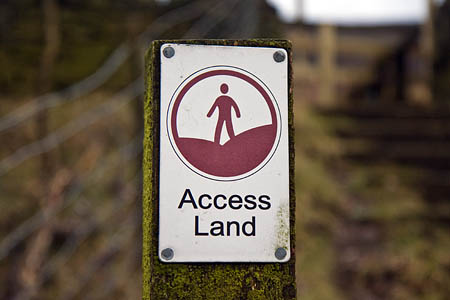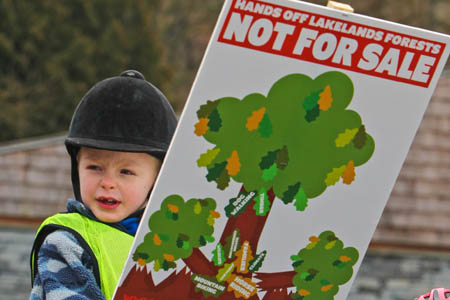
Open access was central to the CRoW Act, which is under consideration by the Red Tape Challenge site
Britain’s largest campaign group for walkers has hit out at coalition Government plans to undermine right-to-roam laws in England and Wales.
The Ramblers said the Government’s Red Tape Challenge puts at risk one of the cornerstones of the last Labour Government’s outdoors advances, the Countryside and Rights of Way Act which, for the first time, granted rights to walk over vast swathes of land previously out of bounds.
Calling the act ‘red tape’ is farcical, the Ramblers said.
And online campaign group 38 Degrees has also started collecting names against the move, which also threatens environmental laws protecting the countryside and wildlife.
The Government’s Red Tape Challenge website calls on the public to put forward ideas to reduce legislation on a range of subjects. Referring to biodiversity, wildlife management, landscape, countryside and recreation laws, it says: “These regulations are designed to conserve vulnerable or rare species and habitats and protect important wildlife sites. They also include regulations on rights of way and protecting national parks.

David Cameron: claimed his government 'greenest ever'. Photo: Conservative Middle East Council CC-BY-SA-3.0
“Tell us what you think should happen to these regulations and why, being specific where possible: should they be scrapped altogether? Can they be merged with existing regulations? Can we simplify them – or reduce the bureaucracy associated with them? Have you got any ideas to make these regulations better? Do you think they should be left as they are?”
But the Ramblers said they are particularly concerned that entire acts dedicated to protecting the environment, and people’s enjoyment of it, are included in the list of so-called burdensome regulations.
Adrian Morris, Ramblers’ head of campaigns, said: “We will fight strongly against moves by Government to reduce the protection of the environment or people’s ability to access and enjoy it.
“The idea that entire acts dedicated to protecting our countryside, the air we breathe and the places where we walk and live, could be described as red tape seems almost farcical.
“Whilst we would welcome a review of legislation which aims to ensure that our environment is fully protected and can be enjoyed by all more easily – the idea that these laws could be cut away like red tape with no consequences for ourselves and future generations shows a short-sighted lack of understanding of the importance of laws which protect our environment for all.”
Before the 2010 general election, grough asked Richard Benyon, the then shadow minister for agriculture, fisheries and wildlife, if a Conservative government would repeal the Countryside and Rights of Way Act. His researcher Charlotte Jenner told us: “We have no plans to do so.” grough said at the time: “Fans of Yes Minister semantics will notice the careful use of language.
“Having no plans to do so is not the same as not doing it, but the indication is, at least, positive. It’s likely Cameron’s cadre would have bigger fish to fry in its first session, such as wielding the big axe on public spending.”

Forest sell-off plans prompted a huge revolt from a wide range of opponents
But indications from the responses on the coalition Government’s Red Tape Challenge website are that it may again have again misjudged the public’s concern for the outdoors and countryside, as it did when it was forced into a u-turn on the sell-off of Forestry Commission land in England.
Of 340 postings covering biodiversity, wildlife management, landscape, countryside and recreation and environment on the site at the time of writing, the overwhelming majority said current regulations are necessary and are not red tape. Many wanted environmental laws strengthened, and only 36 members of the public said laws should be changed or scrapped, often just specific parts of acts.
A small group of hangliders and paragliders wants the Countryside and Rights of Way Act amended to allow them on to open access land to practise their pastime.
A small vociferous group wants the Climate Change Act repealed because it does not agree with the act’s underlying rationale that climate change may be the result of human activity.
A Department for Business spokesman said: “We are asking the public and business to tell us what they think of the more than 21,000 regulations currently on the statute book.
“Some of these regulations are vital to protect minority groups, consumers, employees or the environment, but others may be badly enforced or just plain obsolete. Our priority is to focus on regulations that place unnecessary burdens on businesses and society, but we wanted to give the public the opportunity to tell us what they thought about all legislation, not pick and choose.
“The Government is absolutely committed to protecting the environment and people’s right to access, but we want to reduce the burdens that rules and regulations place on our businesses. We want to hear from everyone, whether you think that a regulation is well designed and provides vital protections, or if it is badly designed or badly implemented.”
The website 38 Degrees, which garnered half a million names in opposition to the forest and woodland sell-off, says on its site: “The Government is planning to scrap green laws which protect our planet and help prevent climate change. Politicians claim that these important laws that reduce emissions, protect wildlife and the countryside are ‘red tape’ that we’re better off without.
“In many cases, public pressure led to the laws being made in the first place. Now, we need to work together to show that there’ll be a huge, people-powered outcry if they scrap these precious laws which protect our environment.”
John Sauven, director of Greenpeace, said: “David Cameron needs to come out and say the Climate Change Act, central to the push for a clean technology revolution, is safe from the axe.
“But if ministers are serious about scrapping it and other vital environmental regulations then we’ll be looking at something akin to the worst excesses of the Bush-Cheney White House.”
The Red Tape Challenge consultation began this month and will run to April 2013.
Meanwhile, the organisation that represents hillwalkers and climbers said access for outdoors enthusiasts must be preserved when public land is disposed of.

Cath Flitcroft
The British Mountaineering Council said it would prefer all publicly owned land to remain public but, writing on the council’s website, access and conservation officer Cath Flitcroft said: “In light of Government spending cuts, the recent review of the Forestry Commission estate and the transfer of national park assets to other bodies, it is clear that this is a real issue.
“It is therefore timely to set out clearly measures which secure the appropriate management of these publicly owned and valued areas, and to consider the ways in which the delivery of benefits to public access and wildlife can be maximised.”
The statement follows the news this week that the Peak District National Park Authority is seeking a partner who will either lease or buy the Stanage Edge and North Lees estate, one of the most popular climbing sites in the national park.
The BMC has drawn up a list of measures for any disposal of public land.
- Access must remain a key policy area of any new management plan. Permissive access as well as statutory access needs to be protected.
- Current levels of access, at a minimum, must be maintained.
- Sale or transfer of land to approved bodies and private landowners must require a guarantee of revenue funding for 30 years or more and have contingency funds available to cover unforeseen costs, eg to cover the costs of moorland fires.
- The complexity of running sites for recreation and conservation as well as other land management activities needs to be fully recognised. If new landowners get it wrong, there is no second chance.
- Lease or sale agreements must guarantee long-term access rights are safeguarded – leaseholds and covenants must stand the test of time and resale.
- Organisations with a positive stance on access, recreation and conservation must be given preference. In particular, landowners who have the power to declare land inalienable; this provides additional protection against future developments on land.
- Sale or transfer of access conditions and rights will require a level of expertise to ensure arrangements are kept and met ad infinitum with no impact on the quality of the recreational or wildlife experience.
- The sale or transfer of public land must make clear, economic sense.
- Any new management arrangements must be transparent so the public know their rights.
- Government and local authorities must consult local community groups, users and the public at large about the possible transfer or sale on any publicly owned land.
The BMC further recommends that where current access provision is not safeguarded in law, dedication through the Countryside and Rights of Way Act is sought, as has been the case with all of the BMC’s own land holdings.
The UK Government has indicated that the Red Tape Challenge consultation is not aimed at measures that come under devolved government in Wales, Scotland and Northern Ireland.